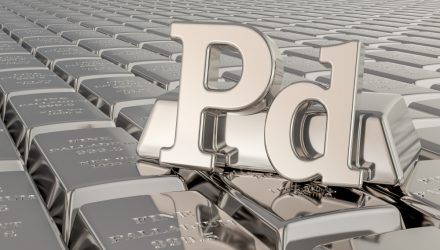The disparity between platinum and palladium ETFs has widened this year as a strong rebound in Chinese car sales helped fuel demand for gasoline autocatalysts.
Year-to-date, the Aberdeen Standard Physical Palladium Shares ETF (NYSEArca: PALL) surged 18.0% while the Aberdeen Standard Physical Platinum Shares ETF (NYSEArca: PPLT) declined 3.0%.
While they have also found support alongside other precious metals in response to aggressive monetary and fiscal measures and investment demand for hard assets as a better store of wealth, palladium and platinum have benefited more from industrial demand, notably as a key component in catalytic converters that reduce harmful emissions from car exhaust.
However, the price of platinum, which is used in diesel-engine catalytic converters, has fallen behind due to the greater preference for gasoline-powered automobiles, which use palladium.
The higher demand for palladium for gasoline-powered vehicles has increased as China’s gasoline-dominated auto markets rebound while Europe’s diesel-heavy car sector struggles amid rising new coronavirus cases and lockdowns, the Wall Street Journal reports.
According to the China Passenger Car Association, Chinese passenger car sales expanded at the fastest pace in over two years in August. Meanwhile, in Europe, car sales plunged 17.6% in August year-over-year and were down by almost a third across the first eight months of 2020, according to the European Automobile Manufacturers’ Association covering the European Union, the U.K., and the European Free Trade Association states.
“The switch from diesel to petrol, the rise of electric vehicles, platinum jewelry not being bought—it all looks quite negative for platinum,” Kirill Kirilenko, a senior analyst covering precious metals at consulting firm CRU, told the WSJ.
Car companies used to use platinum in all autocatalysts but switched over with palladium in gasoline cars over a decade ago since it was cheaper. For example, diesel-engine cars once made up almost 50% of Europe’s auto sales. However, the current environment of lower palladium supply and higher prices have some in the platinum industry hoping for a switch back to platinum.
“The unavailability of palladium is an issue and that’s why I believe that substitution is already happening,” Trevor Raymond, director of research at the WPIC, told the WSJ. “The ‘V-shaped’ recovery in auto sales we are seeing makes substitution more likely.”
For more information on the precious metals market, visit our precious metals category.
